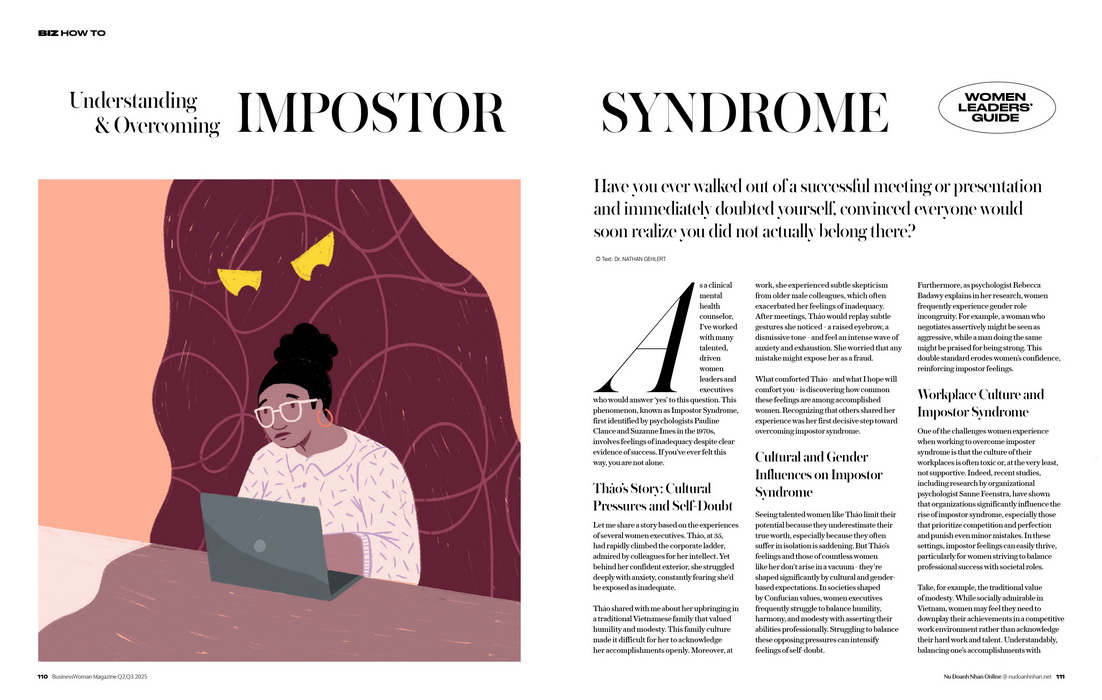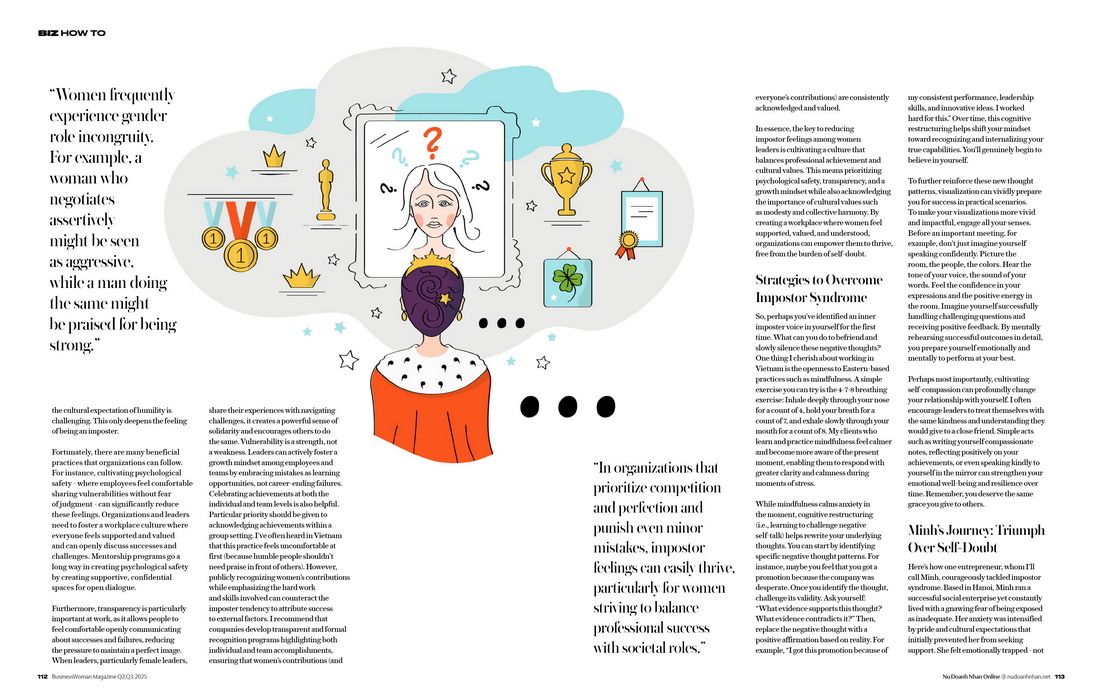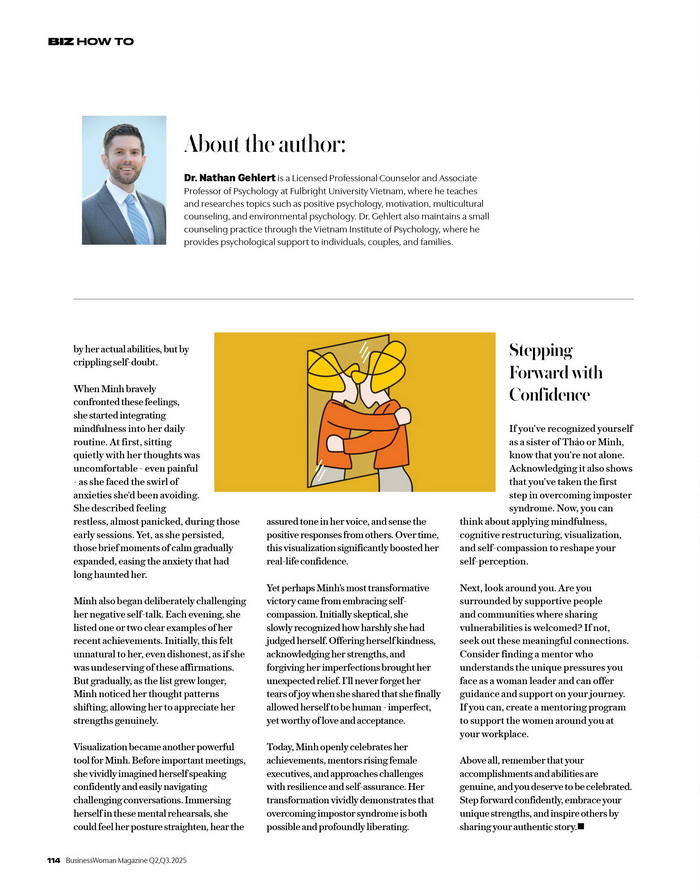Have you ever walked out of a successful meeting or presentation and immediately doubted yourself, convinced everyone would soon realize you did not actually belong there?
As a clinical mental health counselor, I’ve worked with many talented, driven women leaders and executives who would answer ‘yes’ to this question. This phenomenon, known as Impostor Syndrome, first identified by psychologists Pauline Clance and Suzanne Imes in the 1970s, involves feelings of inadequacy despite clear evidence of success. If you’ve ever felt this way, you are not alone.
Thảo’s Story: Cultural Pressures and Self-Doubt
Let me share a story based on the experiences of several women executives. Thảo, at 35, had rapidly climbed the corporate ladder, admired by colleagues for her intellect. Yet behind her confident exterior, she struggled deeply with anxiety, constantly fearing she’d be exposed as inadequate.
Thảo shared with me about her upbringing in a traditional Vietnamese family that valued humility and modesty. This family culture made it difficult for her to acknowledge her accomplishments openly. Moreover, at work, she experienced subtle skepticism from older male colleagues, which often exacerbated her feelings of inadequacy. After meetings, Thảo would replay subtle gestures she noticed – a raised eyebrow, a dismissive tone – and feel an intense wave of anxiety and exhaustion. She worried that any mistake might expose her as a fraud.
What comforted Thảo – and what I hope will comfort you – is discovering how common these feelings are among accomplished women. Recognizing that others shared her experience was her first decisive step toward overcoming impostor syndrome.

Cultural and Gender Influences on Impostor Syndrome
Seeing talented women like Thảo limit their potential because they underestimate their true worth, especially because they often suffer in isolation is saddening. But Thảo’s feelings and those of countless women like her don’t arise in a vacuum – they’re shaped significantly by cultural and gender-based expectations. In societies shaped by Confucian values, women executives frequently struggle to balance humility, harmony, and modesty with asserting their abilities professionally. Struggling to balance these opposing pressures can intensify feelings of self-doubt.
Furthermore, as psychologist Rebecca Badawy explains in her research, women frequently experience gender role incongruity. For example, a woman who negotiates assertively might be seen as aggressive, while a man doing the same might be praised for being strong. This double standard erodes women’s confidence, reinforcing impostor feelings.
Workplace Culture and Impostor Syndrome
One of the challenges women experience when working to overcome imposter syndrome is that the culture of their workplaces is often toxic or, at the very least, not supportive. Indeed, recent studies, including research by organizational psychologist Sanne Feenstra, have shown that organizations significantly influence the rise of impostor syndrome, especially those that prioritize competition and perfection and punish even minor mistakes. In these settings, impostor feelings can easily thrive, particularly for women striving to balance professional success with societal roles.
Take, for example, the traditional value of modesty. While socially admirable in Vietnam, women may feel they need to downplay their achievements in a competitive work environment rather than acknowledge their hard work and talent. Understandably, balancing one’s accomplishments with the cultural expectation of humility is challenging. This only deepens the feeling of being an imposter.
Fortunately, there are many beneficial practices that organizations can follow. For instance, cultivating psychological safety – where employees feel comfortable sharing vulnerabilities without fear of judgment – can significantly reduce these feelings. Organizations and leaders need to foster a workplace culture where everyone feels supported and valued and can openly discuss successes and challenges. Mentorship programs go a long way in creating psychological safety by creating supportive, confidential spaces for open dialogue.
“Women frequently experience gender role incongruity. For example, a woman who negotiates assertively might be seen as aggressive, while a man doing the same might be praised for being strong.”
Furthermore, transparency is particularly important at work, as it allows people to feel comfortable openly communicating about successes and failures, reducing the pressure to maintain a perfect image. When leaders, particularly female leaders, share their experiences with navigating challenges, it creates a powerful sense of solidarity and encourages others to do the same. Vulnerability is a strength, not a weakness. Leaders can actively foster a growth mindset among employees and teams by embracing mistakes as learning opportunities, not career-ending failures.
Celebrating achievements at both the individual and team levels is also helpful. Particular priority should be given to acknowledging achievements within a group setting. I’ve often heard in Vietnam that this practice feels uncomfortable at first (because humble people shouldn’t need praise in front of others). However, publicly recognizing women’s contributions while emphasizing the hard work and skills involved can counteract the imposter tendency to attribute success to external factors. I recommend that companies develop transparent and formal recognition programs highlighting both individual and team accomplishments, ensuring that women’s contributions (and everyone’s contributions) are consistently acknowledged and valued.
In essence, the key to reducing impostor feelings among women leaders is cultivating a culture that balances professional achievement and cultural values. This means prioritizing psychological safety, transparency, and a growth mindset while also acknowledging the importance of cultural values such as modesty and collective harmony. By creating a workplace where women feel supported, valued, and understood, organizations can empower them to thrive, free from the burden of self-doubt.

Strategies to Overcome Impostor Syndrome
So, perhaps you’ve identified an inner imposter voice in yourself for the first time. What can you do to befriend and slowly silence these negative thoughts?
One thing I cherish about working in Vietnam is the openness to Eastern-based practices such as mindfulness. A simple exercise you can try is the 4-7-8 breathing exercise: Inhale deeply through your nose for a count of 4, hold your breath for a count of 7, and exhale slowly through your mouth for a count of 8. My clients who learn and practice mindfulness feel calmer and become more aware of the present moment, enabling them to respond with greater clarity and calmness during moments of stress.
While mindfulness calms anxiety in the moment, cognitive restructuring (i.e., learning to challenge negative self-talk) helps rewrite your underlying thoughts. You can start by identifying specific negative thought patterns. For instance, maybe you feel that you got a promotion because the company was desperate. Once you identify the thought, challenge its validity. Ask yourself: “What evidence supports this thought? What evidence contradicts it?” Then, replace the negative thought with a positive affirmation based on reality. For example, “I got this promotion because of my consistent performance, leadership skills, and innovative ideas. I worked hard for this.” Over time, this cognitive restructuring helps shift your mindset toward recognizing and internalizing your true capabilities. You’ll genuinely begin to believe in yourself.
To further reinforce these new thought patterns, visualization can vividly prepare you for success in practical scenarios. To make your visualizations more vivid and impactful, engage all your senses. Before an important meeting, for example, don’t just imagine yourself speaking confidently. Picture the room, the people, the colors. Hear the tone of your voice, the sound of your words. Feel the confidence in your expressions and the positive energy in the room. Imagine yourself successfully handling challenging questions and receiving positive feedback. By mentally rehearsing successful outcomes in detail, you prepare yourself emotionally and mentally to perform at your best.
“In organizations that prioritize competition and perfection and punish even minor mistakes, impostor feelings can easily thrive, particularly for women striving to balance professional success with societal roles.”
Perhaps most importantly, cultivating self-compassion can profoundly change your relationship with yourself. I often encourage leaders to treat themselves with the same kindness and understanding they would give to a close friend. Simple acts such as writing yourself compassionate notes, reflecting positively on your achievements, or even speaking kindly to yourself in the mirror can strengthen your emotional well-being and resilience over time. Remember, you deserve the same grace you give to others.
Minh’s Journey: Triumph Over Self-Doubt
Here’s how one entrepreneur, whom I’ll call Minh, courageously tackled impostor syndrome. Based in Hanoi, Minh ran a successful social enterprise yet constantly lived with a gnawing fear of being exposed as inadequate. Her anxiety was intensified by pride and cultural expectations that initially prevented her from seeking support. She felt emotionally trapped – not by her actual abilities, but by crippling self-doubt.
When Minh bravely confronted these feelings, she started integrating mindfulness into her daily routine. At first, sitting quietly with her thoughts was uncomfortable – even painful – as she faced the swirl of anxieties she’d been avoiding. She described feeling restless, almost panicked, during those early sessions. Yet, as she persisted, those brief moments of calm gradually expanded, easing the anxiety that had long haunted her.
Minh also began deliberately challenging her negative self-talk. Each evening, she listed one or two clear examples of her recent achievements. Initially, this felt unnatural to her, even dishonest, as if she was undeserving of these affirmations. But gradually, as the list grew longer, Minh noticed her thought patterns shifting, allowing her to appreciate her strengths genuinely.
Visualization became another powerful tool for Minh. Before important meetings, she vividly imagined herself speaking confidently and easily navigating challenging conversations. Immersing herself in these mental rehearsals, she could feel her posture straighten, hear the assured tone in her voice, and sense the positive responses from others. Over time, this visualization significantly boosted her real-life confidence.
Yet perhaps Minh’s most transformative victory came from embracing self-compassion. Initially skeptical, she slowly recognized how harshly she had judged herself. Offering herself kindness, acknowledging her strengths, and forgiving her imperfections brought her unexpected relief. I’ll never forget her tears of joy when she shared that she finally allowed herself to be human – imperfect, yet worthy of love and acceptance.
Today, Minh openly celebrates her achievements, mentors rising female executives, and approaches challenges with resilience and self-assurance. Her transformation vividly demonstrates that overcoming impostor syndrome is both possible and profoundly liberating.
Stepping Forward with Confidence
If you’ve recognized yourself as a sister of Thảo or Minh, know that you’re not alone. Acknowledging it also shows that you’ve taken the first step in overcoming imposter syndrome. Now, you can think about applying mindfulness, cognitive restructuring, visualization, and self-compassion to reshape your self-perception.
Next, look around you. Are you surrounded by supportive people and communities where sharing vulnerabilities is welcomed? If not, seek out these meaningful connections. Consider finding a mentor who understands the unique pressures you face as a woman leader and can offer guidance and support on your journey. If you can, create a mentoring program to support the women around you at your workplace.
Above all, remember that your accomplishments and abilities are genuine, and you deserve to be celebrated. Step forward confidently, embrace your unique strengths, and inspire others by sharing your authentic story.

Author: Dr. Nathan Gehlert is a Licensed Professional Counselor and Associate Professor of Psychology at Fulbright University Vietnam, where he teaches and researches topics such as positive psychology, motivation, multicultural counseling, and environmental psychology. Dr. Gehlert also maintains a small counseling practice through the Vietnam Institute of Psychology, where he provides psychological support to individuals, couples, and families.

Có thể bạn quan tâm:


